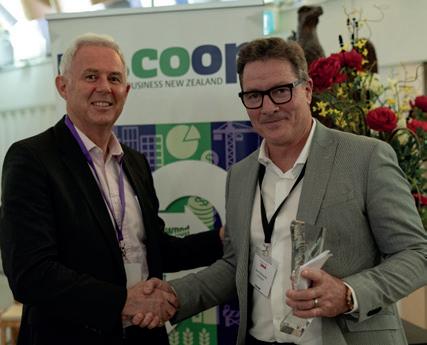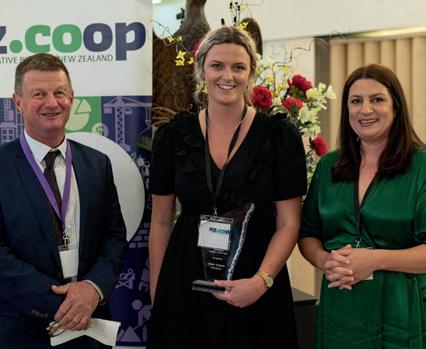
5 minute read
Celebrating co-operative success
Farmlands’ Head of Sustainability and Land Use, Katie Vickers and former Chairman Lachie Johnstone were among those noted for their significant contribution to the rural agri-business co-operative in November. The Cooperative Business New Zealand Awards, held at Christchurch’s temporary City Cathedral, celebrates and honours those who have made a fundamental difference within a co-operative business.
A new award for the year, the Emerging Leader of the Year 2020 received many top-quality nominations from around the country. The Emerging Leader of the Year recognises an individual (under 35) who is making their mark within their organisation or an individual who has established a co-operative. The award aims to honour contribution through innovation, driving best practice, collaboration or co-operation. This year, the recipient was Katie Vickers.
| Judging Panel member Alastair Hercus and Farmlands Director of External Relations Mark McHardy, who accepted the award on behalf of Lachie Johnstone. Recently stepping into the Head of Sustainability and Land Use role after 6 years within the Marketing and Category teams at Farmlands, Katie was not expecting to be standing up with a microphone in her hand on the night. “I’m very grateful to be recognised but this was very unexpected!” Katie laughs. “It’s difficult to express my gratitude to Farmlands for the support and opportunities that I’ve had over the years. I would also like to thank the Cooperative Business New Zealand for putting this event on to celebrate businesses and people. “The co-operative model lends itself to building relationships and this resonates with me a lot. The food and fibre sector will be fundamental in leading New Zealand’s economic recovery following 2020 and it’s a privilege to be a part of it.” Former Chairman of Farmlands, Lachie Johnstone was also celebrated for his service to the co-operative, receiving an Outstanding Co-operative Contribution 2020 award. Lachie became the inaugural Chairman of the newly created Farmlands Co-operative following the merger between South Island-based CRT Co-operative and North Island-based Farmlands Trading Society in 2013. He worked tirelessly with management to steer the new co-operative towards a more compelling vision of the future and was at the helm of the development and implementation of the business transformation programme — Braveheart — which consolidated all of Farmlands’ legacy IT systems into one.
| Judging Panel member Phil McKendry with Farmlands Head of Sustainability and Land Use Katie Vickers and Fonterra General Manager of Capital Strategy Emma Parsons.

Lachie stood down from the Farmlands Board in November 2019 after more than 20 years with the co-operative. Cooperative Business New Zealand Chief Executive Roz Henry praised Lachie’s commitment to the cooperative model. “He is someone who has upheld the co-operative principles and this was particularly evident during the formation of Farmlands Co-operative, when he was truly focused on ensuring the new co-operative was based on the core values of the model and that the structure would provide a livelihood for members,” Roz says. Unfortunately Lachie was unable to attend the awards night and his award was accepted on his behalf by Farmlands’ Director of External Relations, Mark McHardy.
For a full list of award winners, please see www.nz.coop/news-directory
FARMLANDS SUSTAINABILITY FRAMEWORK
Our Internal Organisational Strategy: Become Sustainable
PEOPLE
PLANET
PROFIT Focus
Our Farmlanders
Our suppliers
Our shareholders and communities
Carbon emissions
Minimising waste
Efficiency
Our Internal Aspirations and Targets UN Sustainable Development Goals
GOAL: Support our employees to work in an environment where sustainability is integrated into all operational procedures. Align sustainability with our existing Farmlands values of Courage, Unity, Trust, Influence, Forward Thinking and Integrity. HOW WE GET THERE: Identifying and managing the impact of business on our staff by:
Promoting health and wellbeing.
Ensuring safety.
Fostering high performance and providing development opportunities.
Encouraging forward thinking and innovation.
Ensuring Farmlands is an inclusive and diverse organisation.
GOAL: Proactively support and encourage suppliers to reduce their greenhouse gas emissions (GHG). HOW WE GET THERE:
Seek value creation opportunities and actively engage with early adopters and process innovators in sustainability.
Consider businesses that put forward their approach to sustainability in our selection of supplier proposals.
Collaborate with other industry leaders to achieve sustainable solutions.
Reduce the amount of packaging received in-store and work with suppliers to investigate alternative packaging options.
GOAL: “Grow shareholder success”
HOW WE GET THERE:
As a New Zealand farmer and grower owned co-operative, our ambition is to support our unique environment, economy, people and culture in our business decisions.
We seek to educate shareholders, share relevant knowledge and provide them with sustainable products and services, enabling them to make informed decisions.
We seek to contribute to New Zealand’s future by engaging our regional rural communities to better understand their perspective and the environment they operate in.
GOALS: Reduce our GHG emissions intensity by more than 30% by 2030. Farmlands recognises we have a responsibility to mitigate the environmental effects caused by our operations. HOW WE GET THERE:
Reduce emissions associated with bulk fuel delivery by 3% per million litres of fuel delivered annually.
Reduce fleet fuel use by 5% annually.
Reducing air travel by 15% annually in favour of remote meeting technologies.
GOAL: Reduce waste sent to landfill by 5% annually. HOW WE GET THERE:
We will work with our waste collection providers to focus on diversion from landfill, obtaining accurate waste weights which will be reported monthly to track progress.
We will investigate the feasibility of recycling materials from our daily operations that are currently being sent to landfill.
GOALS: Reduce fuel usage by company vehicles by implementing an internal fleet management system to promote fuel efficient driving practices. Reduce cost of air travel by embracing remote meeting technologies. HOW WE GET THERE:
Reducing costs and subsequently emissions through improved efficiency across the network.
Addressing bulk fuel delivery efficiency by having main providers provide emissions intensity data and tracking on a monthly basis.
Addressing dry/palletised freight efficiency through the introduction of a freight management programme and the internal scheduling team effectively managing routes.










